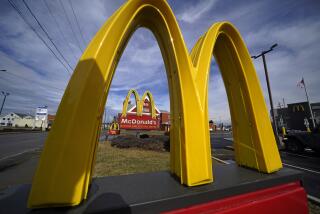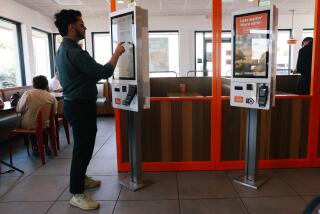In Tragedy, Americans Turn to Takeout Foods
- Share via
Americans may have stayed away from hotels, airplanes and amusement parks in the aftermath of the terrorist attacks, but they still had an appetite for pizza and burgers.
Restaurant sales for the week ended Sept. 16 increased 1.4% from the same period a year ago, with fast-food and takeout eateries showing strong growth, according to a survey of 60 chains by NPD Group Inc., a research and consulting firm in Port Washington, N.Y.
Higher-end and casual-dining restaurants, however, didn’t fare well, as people cut back their purchases of pricey steaks and fresh seafood. In the casual-dining segment alone, sales at restaurants open at least a year declined 5.8%, NPD said.
“Restaurants that could satisfy your need to take food home and sit in front of your TV did well,” said Harry Balzer, a vice president at NPD. “Restaurants that required you to leave your TV--sit-down restaurants--did not.”
With layoffs mounting and consumer confidence down, the restaurant business is expected to experience its slowest growth in a decade. In light of recent events, Technomic Inc., a restaurant research and consulting firm, on Tuesday downgraded its projected annual sales growth for the restaurant industry to 2.5% from 3.3%, including fast-food chains.
But after the terrorist attacks, pizza restaurants, which typically provide takeout and home-delivery service, showed a 3.2% gain, one of their best weeks this year.
Joshua Richman, president of Straw Hat Cooperative Corp., owner of Straw Hat Pizza, said his company’s delivery business boomed as people stayed out of the kitchen and in front of their television sets.
“I think many restaurants took a sharp dip because people were reluctant to spend lots of money and entertain themselves,” Richman said. “We feel fortunate we were able to maintain our business as well as we did.”
San Ramon, Calif.-based Straw Hat has 50 restaurants in California and Nevada, including Los Angeles, Santa Clarita and Long Beach. Hamburger chains Carl’s Jr. and Hardee’s held their own, said Andy Puzder, chief executive of owner CKE Restaurants Inc. in Anaheim. “We were concerned about a big falloff, but we didn’t experience any,” he said.
In difficult economic times, fast-food chains often perform better than in good economic times, said Tim Carlin, a senior associate at Technomic. People often turn to fast-food restaurants because they offer “belly-filling food that’s cheap,” he said.
Despite its slowdown, the restaurant industry should, on the whole, perform better than other sectors, said John Glass, an analyst with Deutsche Banc Alex. Brown in Boston.
“You may not go out and buy that third pair of jeans, but you might still want to go out to a restaurant and feed your family,” he said.
More to Read
Inside the business of entertainment
The Wide Shot brings you news, analysis and insights on everything from streaming wars to production — and what it all means for the future.
You may occasionally receive promotional content from the Los Angeles Times.










